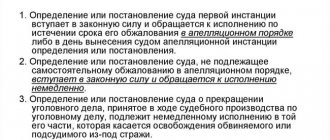How does a court hearing in a civil case work?
A court hearing (SH) is a proceeding conducted in strict compliance with the rules of the Code of Civil Procedure of the Russian Federation in order to resolve disputes between the parties. By law, the parties to the proceedings are considered to be the plaintiff and the defendant. They can protect their interests independently or through legal representatives by proxy.
There can be several participants:
for example, when a plaintiff files a lawsuit against several defendants, or, conversely, a class action lawsuit is filed against one.
First, the case is prepared after the claim is accepted. The parties are invited to a conversation to clarify the circumstances or request additional documents. A preliminary court hearing may be scheduled to request evidence and other materials. Based on the results, a decision is made to assign the case to trial.
Let's look at the next steps in detail.
Opening of the court session
The presiding officer opens the court order, asks the secretary about the attendance of the participants and notification of all persons about the date of the hearing. If any of them is absent, the reasons for non-appearance are clarified.
Next, the composition of the court is announced: Full name. judge, secretary, prosecutor, expert, specialist, translator, participants or their representatives. The reason for the proceedings is explained.
Consideration of the case on the merits
This is the longest part. It all starts with the report of the judge or presiding judge. The opinions of the parties and third parties are heard. The sequence of studying the evidence is established.
What happens during this time:
- At the end of the report, the judge proposes to enter into a settlement agreement. Having agreed to this, the proceedings on the case are terminated and an appropriate ruling is made.
- Witnesses are questioned and expert opinions are examined.
- Stakeholders present their positions. If among the participants there are representatives of the prosecutor’s office or another government agency, they are given the floor first.
- Evidence is studied and presented to interested parties for review.
At the end, the prosecutor or other authorized person gives an opinion on the case.
Interrogation of witnesses
Witnesses are interviewed separately. Before the start of the interrogation, the court reminds of the responsibility for giving knowingly false testimony.
During the interview, the judge finds out their connection and relationship with the participants in the proceedings, as well as relevant circumstances. After the interrogation, the witness remains in the room.
New witnesses are not present at the hearing and are invited separately to exclude the possibility of their communication with those already interviewed.
Note! If a witness has given written testimony in advance but is absent at the hearing, that testimony will be read out. They are equated to evidence (Article 181 of the Code of Civil Procedure of the Russian Federation).
Examination of evidence
The procedure for examining evidence is determined after hearing the opinions of the parties. During the consideration, evidence is presented to the participants in the proceedings.
The inspection protocols drawn up at the location of the material evidence are announced. After the announcement, the participants have the right to give explanations (Article 183 of the Code of Civil Procedure of the Russian Federation).
In conclusion, the prosecutor or other authorized representative of the government agency gives a conclusion. The judge proposes to supplement the case materials. Subsequently, after studying the evidence, expert opinion, specialist consultations and questioning of witnesses, the court proceeds to the debate.
Expert opinion research
If an examination was appointed for the proceedings, the conclusion is examined on the SZ (Article 187 of the Code of Civil Procedure of the Russian Federation). The document is read out by the presiding officer in the absence of an expert.
If he is present at the hearing, the announcement of the conclusion rests with him. After this, interested parties have the right to ask him questions.
Specialist consultations
At the request of the parties or a court ruling, specialists are involved in the study of material or written evidence, the study of video and audio recordings.
The specialist provides technical assistance and advises on specific issues. Explanations are given orally or in writing and are attached to the case file (Article 188 of the Code of Civil Procedure of the Russian Federation).
Judicial debate
The participants or their representatives speak in the debate. The plaintiff is heard first, then the defendant.
After the hearing, they are given the right to make remarks; the defendant speaks last (Article 190 of the Code of Civil Procedure of the Russian Federation).
If the prosecutor is involved in the case, the first word is given to him.
Legal advice: during debates, be sure to justify your words with references to legislative norms. It is necessary to address the court, and not the participants in the process, and use the evidence already presented and examined to your advantage.
Decision-making
The court goes to the deliberation room to make a decision. After this, the presiding officer returns to the hall and announces it.
According to Art. 214 of the Code of Civil Procedure of the Russian Federation, copies of decisions are issued to the parties to the proceedings no later than 5 days from the date of issue. If the plaintiff or defendant did not appear at the last court hearing, copies are sent by registered mail with return receipt requested no later than 5 days from the date of acceptance.
If the document is drawn up in electronic form, with the permission of the participants it is published on the official website without making personal data public.
How long does the meeting last?
The duration can range from 5 minutes to several hours.
It all depends on the following circumstances:
- number of participants;
- involvement of experts or other persons;
- the defendant’s agreement or disagreement with the claims;
- complexity of the case;
- number of motions and objections.
On average, the main meeting takes 1-2 hours.
If we are talking about the total duration of legal proceedings, then everything depends on the specific case. The total review period is 2 months.
Disputes regarding the collection of alimony, reinstatement at work, challenging decisions of municipal authorities on the demolition of unauthorized buildings are considered within 1 month.
When using simplified proceedings, proceedings take up to 1 month; in special proceedings, cases can be considered in 5 days.
How is the protocol drawn up?
The secretary must keep a protocol reflecting all remarks during the hearing. If the secretary does not have time to reflect all the circumstances in the document, he uses an audio recording after the SZ and makes adjustments.
The minutes are signed by the secretary and the presiding officer. In some cases it is conducted by an assistant judge. The document is also given to production participants for review. If they are not satisfied with the content, they submit comments within 5 days after studying.
The consideration of comments is carried out by the judge who signed the protocol. To do this, he is given 5 days from the date of the appeal of the participants in the proceedings.
Who is participating in the meeting?
Each participant is assigned separate roles. Let's consider who is invited and why, what rights and responsibilities they have.
Plaintiff
A plaintiff is a citizen or legal entity whose rights have been violated. On his initiative, proceedings are initiated after the statement of claim is accepted.
During the proceedings, the plaintiff is entitled to:
- get acquainted with the case materials, make extracts;
- ask questions to other participants, witnesses, specialists and experts;
- challenge the judge, secretary, translator, expert;
- file motions and objections;
- give oral and written explanations;
- object to the arguments and motions of other participants;
- express your opinion on the issue under consideration.
Also, during the proceedings, the plaintiff has the right to change the claims, the subject of the claim, increase or decrease the claims, abandon the claim, and enter into a settlement agreement with the defendant.
Defendant
During the proceedings, he is granted the same rights as the plaintiff.
Additionally he can:
- file objections to the claim;
- fully or partially recognize the plaintiff’s claims;
- give explanations;
- submit petitions;
- present evidence in your favor.
The parties have the right to protect their interests through third parties - lawyers. For this you will need a power of attorney. With the participation of defenders, the attendance of the participants is optional (Article 48 of the Code of Civil Procedure of the Russian Federation). Personal participation does not deprive the defendant and plaintiff of having the support of lawyers.
Translator
An interpreter is appointed at the request of a person who does not speak Russian. At the beginning of the court session, the judge explains his rights and obligations when translating explanations and testimony.
To clarify, he can ask the parties questions, as well as get acquainted with the protocol and make comments regarding the correctness of the translation.
Important! Other participants in the proceedings - plaintiffs, defendants, representatives - may not be translators, even if they have the necessary skills and knowledge in the field of foreign languages. This is always only an individual person who does not act as another participant.
Witnesses
According to Art. 70 of the Code of Civil Procedure of the Russian Federation, a citizen summoned as a witness is obliged to appear at the hearing at the appointed time to give truthful testimony. If he cannot come due to illness or other valid reasons, the interrogation is carried out at his place of residence.
Witnesses are guaranteed the right to reimbursement of expenses for wasting their time to attend court, as well as compensation for expenses for other needs related to the proceedings.
The procedure and amount of compensation are established by Decree of the Government of the Russian Federation dated December 1, 2012 No. 1240.
Prosecutor's office
According to Art. 45 of the Code of Civil Procedure of the Russian Federation, the prosecutor participates in proceedings to protect the rights and interests of citizens, and in some cases is involved in considering cases of:
- reinstatement at work;
- eviction;
- compensation for harm to life and health;
- adoption;
- forced hospitalization of a citizen;
- establishing incapacity;
- recognition of a person as dead or missing.
During the court hearing, the prosecutor involved in the cases gives an opinion. If he is the applicant, he is entitled to the same rights as the plaintiff.
Child protection
Representatives of guardianship authorities are involved in cases of protecting the interests of children.
They give an opinion on the possibility of adoption, determining the child’s place of residence with one of the parents, deprivation of parental rights, etc.
The guardianship authority is not a party to the proceedings; it acts as a separate government agency.
Experts
When an examination is scheduled, an expert is invited to provide explanations on the conclusion.
The expert can:
- ask to become familiar with the case materials;
- request additional materials for research;
- ask questions to other participants.
The expert also has the right to apply for the involvement of other specialists (Article 85 of the Code of Civil Procedure of the Russian Federation).







